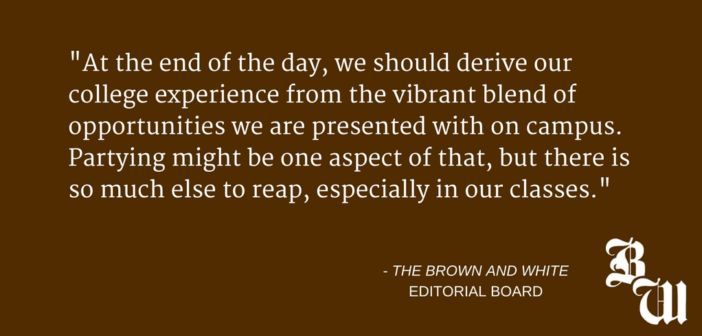It’s time to have the talk.
No one enjoys it, and its role as a progressive step is countered by feelings of discomfort from both parties. Nonetheless, we all need to be on the same page.
But this talk, Lehigh’s talk, is not about sex — it’s about campus climate.
After dueling melodies between the administration and the student body in regard to student safety and effective policing have persisted this school year, they have reverberated in harmony during the month of April.
Two emails calling for action have been sent out to the Lehigh community: one signed by a number of high level administrators and one signed by a number of Lehigh student organizations. The students showed support for the administration’s concerns about safety and urged Lehigh to participate in an open conversation about what they call “a campus climate crisis” on April 26.
The original email by the administrators was prompted by what they explained as four isolated incidents of excessive alcohol consumption that nearly led to fatal cases. To be clear, as terrible as these situations are, the incidents alone are not enough to extrapolate claims about Lehigh’s campus climate. Often the most dangerous situations arise when a first-time drinker has trouble finding their limits.
However, with confirmation from student leaders in their email and, furthermore, the well-known affinity Lehigh has for placing highly in national party school rankings, the climate issue becomes more apparent. It creates the image that Lehigh students are more inclined to drink than they are to do work.
Of course, the goal is to strike a balance.
The cliché clearly states: work hard, play hard. And evidenced by Lehigh’s impressive academics that go along with its party culture, a lot of people here pull it off. However, there are caveats to making this metaphorical mission statement one that can govern an entire campus community.
Firstly, the ability to participate in party culture is a privilege not everyone has.
For affluent students, specifically ones with connections to the professional world, academics could be just a minor factor in the college experience. An impending job is likely, even if it takes a couple of years after graduation. They have a financial safety net in place.
Alternatively, some students can barely afford to attend college in the first place, even with financial aid. Why would they make anything but academics a priority? If they do not succeed in school, the future will be grim.
But even for those who have the safety net, enabling them to roll back on their academic pursuits in search of a free-spirited lifestyle, not all of them can make it work. And often, by the time that is discovered it’s too late to re-prioritize.
The party culture at Lehigh is akin to quicksand at times, making it difficult for students who want to refocus their attention on their education to do so without a social stigma coming into play.
At the end of the day, we should derive our college experience from the vibrant blend of opportunities we are presented with on campus. Partying might be one aspect of that, but there is so much else to reap, especially in our classes. Even if you have the money to waste, it is hard to justify when you take a step back.
While directing blame at campus climate can be offensive to some because it is rooted in individual identities as well, we need to think about progress for Lehigh in a critical manner.
Even if you are someone who drinks seven days a week and still achieves a 4.0 GPA, these emails prompting dialogue among the members of the Lehigh community, if anything else, are a recognition we are thinking progressively.
You don’t have to agree, but at least have the talk.






Comment policy
Comments posted to The Brown and White website are reviewed by a moderator before being approved. Incendiary speech or harassing language, including comments targeted at individuals, may be deemed unacceptable and not published. Spam and other soliciting will also be declined.
The Brown and White also reserves the right to not publish entirely anonymous comments.
2 Comments
Often the most dangerous situations arise when a first-time drinker has trouble finding their limits.”
It would be interesting to see what causes the most dangerous situations, I’m betting for either peer pressure or the competitive urge.
Pingback: A College Commentary: doses and mimosas — College and University